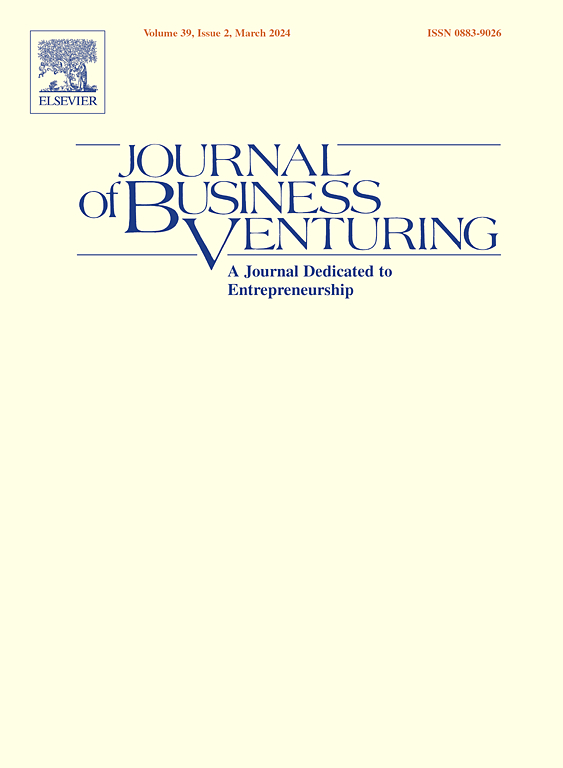犯罪、社区社会资本和企业家精神:来自澳大利亚社区的证据
摘要
犯罪对社区来说是一种反社会的祸害,它增加了做生意的成本,包括企业家的成本。利用澳大利亚的纵向数据,这项研究考察了犯罪率和社区内创业倾向之间的联系。我们通过将创业倾向与犯罪发生的社区层面的犯罪类型相匹配来做到这一点。我们发现,较高的总犯罪率,人身犯罪和财产犯罪,显著降低了社区的创业倾向。我们还表明,社区社会资本的核心方面-信任,自愿组织的成员资格和支持与合作-调解了这种关系。我们全面研究了更高的社区犯罪率——人身犯罪和财产犯罪——是否会导致更低的创业率。创业研究广泛地考察了获得社会资本(定义为一个人在自己的社区中获得的社会资源)如何促进创业。这项研究考虑了普遍存在的社区动态犯罪是否会阻碍企业家精神。具体地说,我们表明两种主要的犯罪——人和财产——抑制了企业家精神。我们展示了社区社会资本的各个方面,调解犯罪和创业之间的关系。我们通过考虑高犯罪率如何降低社会资本,进而降低企业家精神,来了解社区社会资本在促进企业家精神方面的作用(Kwon等人,2013)。我们表明,关系社会资本的核心方面——信任、社区机构的自愿成员、支持和合作——调解了犯罪与创业之间的关系。同样,拥有更强大社会资本储备的社区能够更好地抵御犯罪和促进创业。研究犯罪和企业家精神之间的联系使我们能够对企业家精神和社会资本的文献做出贡献。我们讨论了犯罪减少塑造企业家精神的社会资本的各种方式。在我们以社区社会资本理论为基础的框架中,犯罪造成不信任,因为它使公民感到厌倦,对彼此更加怀疑,阻碍了为企业分享思想和知识。犯罪阻碍了以社区为基础的组织的效力和成员资格,而这些组织允许企业家建立网络。犯罪减少了创业者在重点社区开办和维持企业的支持,因为个人会在社区外寻找机会和资源。犯罪削弱了人们对社区的自豪感和认同感,这一点可以从社区组织的自愿成员资格中得到证明。犯罪减少了合作,因为它会导致自我保护行为,包括逃离高犯罪率社区,这阻碍了互惠的规范。犯罪减少了合作,因为犯罪分子更有可能采取强制手段,通过监视和暴力来解决商业问题。调查结果依赖于澳大利亚邮政编码地区犯罪率的综合数据库。犯罪通常是一种局部现象——它影响当地社区的商业成果。我们从每个澳大利亚州和地区警察部队或相关政府机构获得社区一级的犯罪率,并根据邮政编码将这些数据与创业率进行匹配。我们的主要识别策略遵循Dustmann和Fasani(2016),他们估计了英国当地犯罪对心理健康的影响。如果没有本地犯罪的内生迁移,这种识别策略消除了居住分类的影响,并将犯罪与时间变化的未观察到的创业决定因素联系起来。主要的研究结果对于搬家工人所面临的当地犯罪和个人居住的州或地区的历史堕胎率,以及许多其他获得因果推理的方法都是强有力的。这篇文章对寻求促进社区创业的政策制定者具有相当大的实际意义。我们的研究与致力于促进当地创业的社区领导人和政策制定者高度相关。研究结果强烈表明,努力减少犯罪是保护社区内社会资本的主要机制,因此也保护了企业家精神。致力于创建和扩大社会企业的政策举措将a)促进企业家精神和社会资本,b)减轻犯罪对企业家精神的有害影响(Wry和York, 2017)。Crime is an anti-social blight on communities that increases the cost of doing business, including for entrepreneurs. Drawing on Australian longitudinal data, this study examines the links between crime rates and the propensity for entrepreneurship within communities. We do so by matching propensity for entrepreneurship with types of crime found at the community level where crime occurs. We find that higher total crime rates, crimes against the person and property crime, significantly lower the propensity for entrepreneurship in communities. We also show that the core facets of community social capital – trust, membership in voluntary organizations and support and cooperation – mediate this relationship.
Executive summary
We comprehensively examine whether higher community crime rates – crime on people and crime on property – cause lower rates of entrepreneurship. Entrepreneurship research extensively examines how gaining social capital, defined as the social resources one gains within one's community, promotes entrepreneurship. This study considers whether a pervasive community dynamic in crime impedes entrepreneurship. Specifically, we show that the two main kinds of crime – people and property – inhibit entrepreneurship.
We show the facets of community social capital that mediate the relationship between crime and entrepreneurship. We inform the role of community-based social capital in promoting entrepreneurship (Kwon et al., 2013) by considering how higher crime lowers social capital and in turn entrepreneurship. We show that core facets of relational social capital – trust, voluntary membership in community bodies, support, and cooperation – mediate the relationship between crime and entrepreneurship. Likewise, communities with more robust reserves of social capital are better able to withstand crime and promote entrepreneurship.
Examining the link between crime and entrepreneurship allows us to contribute to the literature on entrepreneurship and social capital. We discuss the various ways in which crime diminishes social capital to shape entrepreneurship. In our framework that is predicated on theory on community social capital, crime creates distrust because it causes citizens to be wearier and more suspicious of each other, impeding sharing of ideas and knowledge for ventures. Crime impedes the efficacy and membership of community-based organizations that allow entrepreneurs to network. Crime reduces the support available for founders to start and sustain businesses in focal communities, as individuals seek opportunities and resources outside their communities. Crime diminishes the extent to which people take pride in and identify with their communities, as evidenced by voluntary membership in community organizations. Crime reduces collaboration because it leads to self-protective behaviors, including flight from high-crime communities, that hinder norms of reciprocity. Crime reduces cooperation as criminals are more likely to resort to coercion, as enforced by monitoring and violence, to solve business problems.
Findings rely on a comprehensive database of crime rates across Australian postcodes. Crime is typically a localized phenomenon – it affects business outcomes in local communities. We obtain community-level crime rates from each Australian state and territory police force or relevant government agencies and match these data with entrepreneurship rates by postcode. Our primary identification strategy follows Dustmann and Fasani (2016), who estimate the effect of local area crime on mental health in the United Kingdom (UK). This identification strategy removes the effects of residential sorting and correlates crime with time-varying unobserved entrepreneurship determinants if there is no endogenous migration from local crime. The main findings are robust to instrumenting for local area crime to which movers are exposed and for historical abortion rates in the state or territory where the individual lives, as well as a number of other approaches to obtaining causal inference.
The article holds considerable practical relevance for policymakers seeking to promote community entrepreneurship. Our study is highly relevant to community leaders and policymakers working to boost local entrepreneurship. Findings strongly suggest that efforts to reduce crime are a primary mechanism to protect social capital within communities and, therefore, entrepreneurship. Policy initiatives dedicated to creating and expanding social ventures would a) boost entrepreneurship and social capital and b) mitigate the detrimental effects of crime on entrepreneurship (Wry and York, 2017).

 求助内容:
求助内容: 应助结果提醒方式:
应助结果提醒方式:


